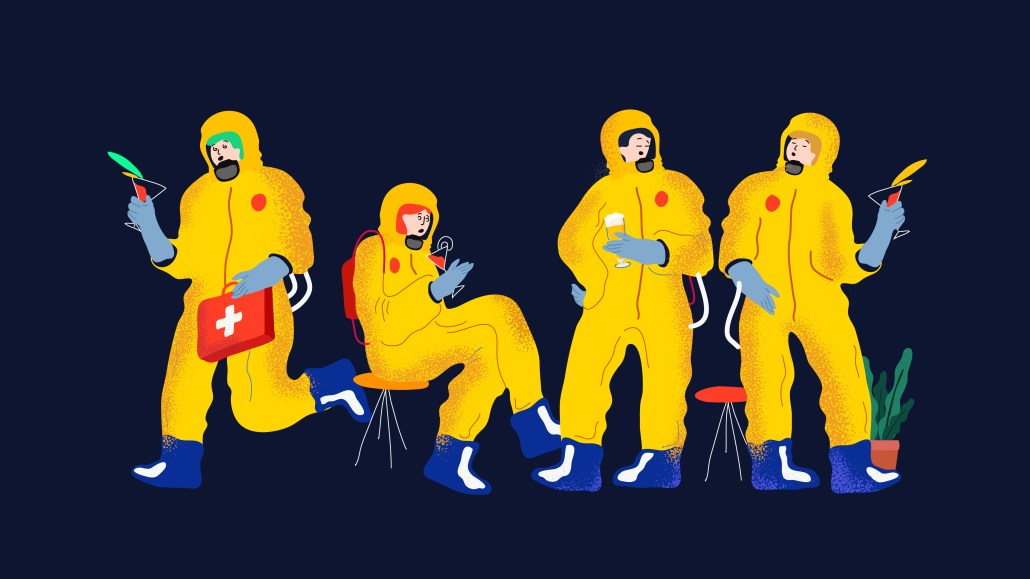Secure your place at the Digiday Media Buying Summit in Nashville, March 2-4
Seamless gift cards, care packages and meditation app subscriptions: How ad sellers are adapting their sales tactics

Ad sales staples, such as lunch-and-learn meetings and product giveaways, have had to adapt to the quarantine. In lieu of catered meals inside company meetings rooms, streaming services like Xumo and ad tech firms such as Innovid are demoing their products over Zoom with meals delivered via Uber Eats. And instead of SoulCycle classes, TV networks are offering agency executives subscriptions to meditation apps.
Considering how many advertisers have canceled or paused campaigns as they deal with pandemic, these not-so-subtle sales pitches may seem particularly superfluous at the moment. However, in an industry that likes to describe itself as a relationship business, agency executives on the receiving end of these offerings said they have become valuable for managing relationships at a time when there isn’t much business to be done — so long as they are handled properly.
“Everyone wants to do a webinar, and it feels very opportunistic and salesy,” said one agency executive. “The tone matters more than anything else.”
As an example of how companies’ approaches can differ, this agency executive said they have received food delivery gift cards from two different ad tech companies. In one case, the company sent it seemingly at random with no communication from the sales representative at the company. In the other case, the company’s sales rep sent an email asking for ideas of shows to stream during quarantine. “It’s the difference between ‘Hey, here’s a coupon’ and ‘Hey, how can I engage with you from a relationship perspective?’” this executive said.
To their credit, those on the sales side largely are skewing more toward the interpersonal versus the nakedly transactional, according to agency executives.
“[TV] networks are coming back to advertisers and agencies and saying, ‘How can we help you in any way?’” said a second agency executive. This executive, who has been in the industry for more than three decades and worked through multiple economic downturns, said the extent of these current relationship management efforts are “something novel. I haven’t seen this before.”
What would normally be considered gifts are being received as care packages by agency executives. In some cases, the items, such as gift cards to food delivery apps, are being offered in exchange for agency executives participating in virtual lunch-and-learn meetings. But in others, they are being provided with no strings attached, such as the $7 gift cards for Amazon Prime Video movie rentals that Innovid has sent streaming video ad buyers.
The gestures have gone beyond such gifts to be more open-ended offers of aid, be that creative services assistance or Sudoku strategy advice, according to agency executives. “It’s not really a sales conversation anymore,” said Clair Bergam, associate media director at The Media Kitchen.
While ad sellers are asking if there’s any data they can provide to help agencies and advertisers navigate the present uncertainties — and implicitly steer any available ad dollars in the media companies’ direction — they are more often checking in to see how people are coping and sharing puzzle ideas and other ways they are passing the time in quarantine. “It’s been a breath of fresh air,” said Bergman.
More in Marketing

Future of Marketing Briefing: AI’s branding problem is why marketers keep it off the label
The reputational downside is clearer than the branding upside, which makes discretion the safer strategy.

While holdcos build ‘death stars of content,’ indie creative agencies take alternative routes
Indie agencies and the holding company sector were once bound together. The Super Bowl and WPP’s latest remodeling plans show they’re heading in different directions.

How Boll & Branch leverages AI for operational and creative tasks
Boll & Branch first and foremost uses AI to manage workflows across teams.





